 Petzlover
Petzlover Briquet Griffon Vendeen is originated from France but Spanish Water Dog is originated from Spain. Both Briquet Griffon Vendeen and Spanish Water Dog are having almost same height. Both Briquet Griffon Vendeen and Spanish Water Dog are having almost same weight. Both Briquet Griffon Vendeen and Spanish Water Dog has same life span. Both Briquet Griffon Vendeen and Spanish Water Dog has almost same litter size. Briquet Griffon Vendeen requires High Maintenance. But Spanish Water Dog requires Moderate Maintenance
Briquet Griffon Vendeen is originated from France but Spanish Water Dog is originated from Spain. Both Briquet Griffon Vendeen and Spanish Water Dog are having almost same height. Both Briquet Griffon Vendeen and Spanish Water Dog are having almost same weight. Both Briquet Griffon Vendeen and Spanish Water Dog has same life span. Both Briquet Griffon Vendeen and Spanish Water Dog has almost same litter size. Briquet Griffon Vendeen requires High Maintenance. But Spanish Water Dog requires Moderate Maintenance
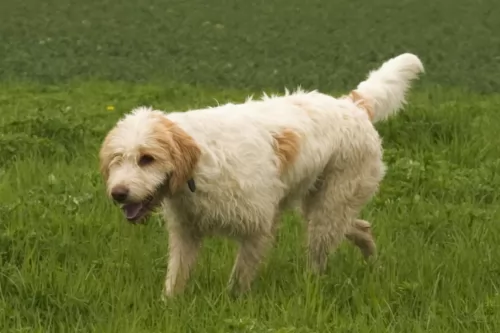 The Briquet Griffon Vendeen, a product of France is a hunting down bred down from the Grand Griffon Vendeen. The two dogs are descendants of the Gaul’s Canis sequsius and the Gris de St. Louis hounds. They are one of four dogs with rough coats from the Vendeen area along France’s west coast. Many of these lines were decimated by the Second World War and are still not found in France today.
The Briquet Griffon Vendeen, a product of France is a hunting down bred down from the Grand Griffon Vendeen. The two dogs are descendants of the Gaul’s Canis sequsius and the Gris de St. Louis hounds. They are one of four dogs with rough coats from the Vendeen area along France’s west coast. Many of these lines were decimated by the Second World War and are still not found in France today.
The Briquet Griffon Vendeen survived the war due to a French dog show judge named Hubert Dezamy, who restored the breed and it is mainly a show dog today. Many of Frances royalty prior to the French Revolution favored the breed as show dogs as well. The Briquet was originally developed for hunting of smaller game and is a scent hound. The larger Grand Griffon Vendeen was used in the hunt for large game, namely wolves and boar.
The Briquet Griffon Vendeen is recognized by the UKC and the FCI but not by the AKC and the breed is hardly known outside of France
 Bred in Spain to guard and herd sheep, the Spanish Water Dog was also used in hunting because he could retrieve in water. The breed is closely aligned with other water dogs like the Irish Water Spaniel, Portuguese Water Dog and French Barbel. It is especially true that the Spanish Water Dog and the Portuguese Water Dog share some of the same ancestors. The two breeds are closely related.
Bred in Spain to guard and herd sheep, the Spanish Water Dog was also used in hunting because he could retrieve in water. The breed is closely aligned with other water dogs like the Irish Water Spaniel, Portuguese Water Dog and French Barbel. It is especially true that the Spanish Water Dog and the Portuguese Water Dog share some of the same ancestors. The two breeds are closely related.
In the early days of the breed, they were separated into three different sizes and types. The dogs from Northern Spain were smaller than the others and came from the regions of Cantabria and Asturias. These lighter colored dogs eventually became their own breed – the Cantabria Water Dog. The second group came from western Andalusia marsh lands. He had a long chorded coat. The third group was the strongest and largest and came from the southern Andalusian sierras. This was by far the largest and most influential group, most of whom were herders. Eventually the groups interbred and today’s SWD carries the traits of all three. They were and still are a very versatile breed. In addition to herding they fished or retrieved for hunters.
The breed was revived in the 1970”s by two breeders, Santiago Montesinos and Antonio Garcia Perez travelled through southern Spain to buy or borrow dogs for breeding. By 1980, they had established the Spanish Water Dog Club of Spain and reestablished the breed. They fought to the breed recognized in Spain first. After five years of hard work, the Federation Cynologique Internationale recognized the breed permanently in 1999.
The UKC, or United Kennel Club, of the United States, recognized the breed in 2001, accepting them for confirmation by 2004. In the United States the breed was championed by Ken and Jerry Mann to attain that UKC recognition. Still the AKC, or American Kennel Club, held out on their recognition. The Manns showed the SWD in 2000 in the AKC Rare Breed Conformation and the UKC multi-breed show in 2004.
The Manns also used their breed for herding in the United States in entered them into the herding competition. In the they advocated for and got the SWD into the herding group for confirmation with the UKC in 2013. The American Kennel Club approved the requests of the Spanish Water Dog Club, Inc and recognized the breed in 2005 as foundation stock. By 2008 the AKC recognized the SWD to be able to compete in field trials by not conformation. In 2015 the SWD will be admitting to AKC conformation and fully recognized as a member of the herding group. They were also recognized by the American Herding Breed Association in 2007.
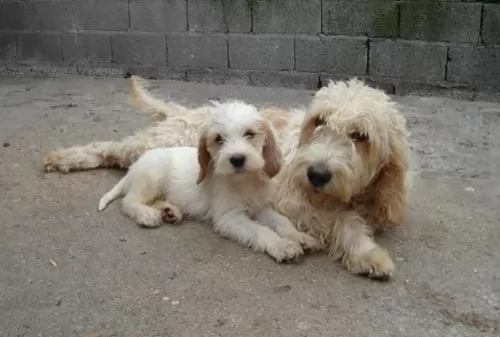 This medium sized dog is stocky and well proportioned. He looks very much like the Grand Griffon Vendeen only smaller. It is less muscular than other hound dogs and it holds its tail up when working. The head is short with a medium/long muzzle. It has low set ears and a flat skull with large, dark eyes and pronounced eyebrows. It also has a mustache.
This medium sized dog is stocky and well proportioned. He looks very much like the Grand Griffon Vendeen only smaller. It is less muscular than other hound dogs and it holds its tail up when working. The head is short with a medium/long muzzle. It has low set ears and a flat skull with large, dark eyes and pronounced eyebrows. It also has a mustache.
 The Spanish Water Dog is an athletic, medium size, robust breed that is not as tall as it is long. In countries like the US, the tails are docked but it is not a conformation fault if they are not. The carry themselves with pride and elegance, have a strong head and expressive eyes which are brown. They have flat skulls and wide set eyes. Their paw pads, eye-rims and nose should be darker than their coat or at least the same color. Their eyes are chestnut, hazel or dark brown and their ears are medium height and triangular. His coat is curly and his topline is straight. With a broad chest and arched rib, he is a very athletic looking dog. The breed has much respiratory capacity with broad shoulders and straight sturdy legs. The breed has rounded feet , tight toes, and resistant pads.
The Spanish Water Dog is an athletic, medium size, robust breed that is not as tall as it is long. In countries like the US, the tails are docked but it is not a conformation fault if they are not. The carry themselves with pride and elegance, have a strong head and expressive eyes which are brown. They have flat skulls and wide set eyes. Their paw pads, eye-rims and nose should be darker than their coat or at least the same color. Their eyes are chestnut, hazel or dark brown and their ears are medium height and triangular. His coat is curly and his topline is straight. With a broad chest and arched rib, he is a very athletic looking dog. The breed has much respiratory capacity with broad shoulders and straight sturdy legs. The breed has rounded feet , tight toes, and resistant pads.
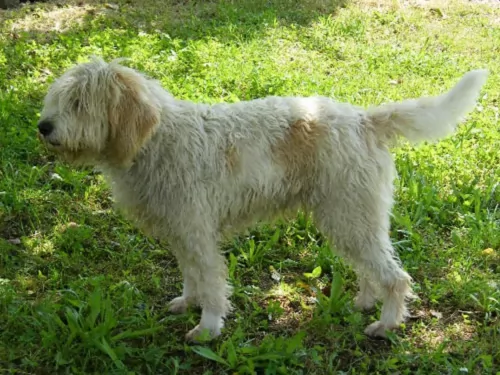 The Briquet Griffon Vendeen is a smart, attentive and sensitive dog. It is easy to train. They are loyal and bond quickly with their owner/trainer. These are enthusiastic dogs with a lot of stamina and get along with dogs and children. They don’t like to be told what to do. They respond well if you bribe them with treats or play with them. They are patient, extroverted and happy dogs.
The Briquet Griffon Vendeen is a smart, attentive and sensitive dog. It is easy to train. They are loyal and bond quickly with their owner/trainer. These are enthusiastic dogs with a lot of stamina and get along with dogs and children. They don’t like to be told what to do. They respond well if you bribe them with treats or play with them. They are patient, extroverted and happy dogs.
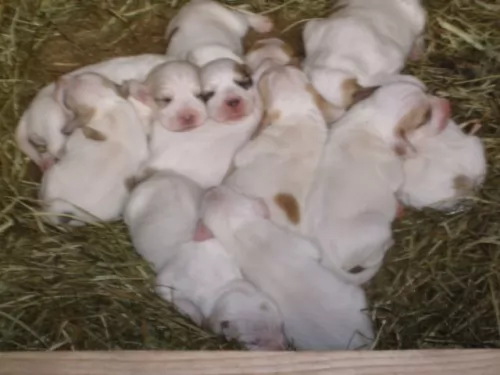 They are bred to be healthy and hardy, but still have some health concerns. These include:
They are bred to be healthy and hardy, but still have some health concerns. These include:
This is a frightening disease if you find your dog has it. It is characterized by a high fever and an intense hypersensitivity to touch. Aseptic Meningitis is an inflammation of the brain. It is caused by an infection and the most common ones include:
 The Spanish Water Dog has much of the same health problems as the other water dogs and dogs their size and heritage. Here are some of the health issues they are prone to.
The Spanish Water Dog has much of the same health problems as the other water dogs and dogs their size and heritage. Here are some of the health issues they are prone to.
• Exocrine Pancreatic Insufficiency – inability to digest food – can be treated.
• CHG – Congenital Hypothyroidism with Goiter – inherited and pups don’t grow correctly.
• Neuroaxonal Dystrophy – cognitive and muscular dysfunction. Vitamin E and insulin deficiency
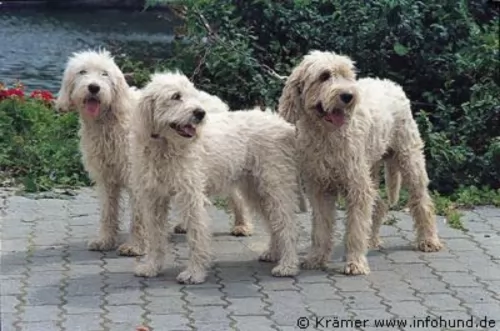 Don’t overfeed your Briquet Griffon Vendeen. Give her at least 2 meals of high quality dry food – two and one half to three cups daily.
Don’t overfeed your Briquet Griffon Vendeen. Give her at least 2 meals of high quality dry food – two and one half to three cups daily.
Every type of Griffon is a strong hunter and has strong instincts. The Briquet is no different. They need to be able to hunt as this is one of the strongest of scent hounds. They need a fenced in yard at the very least to explore and smell. They also enjoy long walks with new smells. Stay in shape because your Briquet Griffon Vendeen has stamina to share.
They love to play in leu of hunting. The games they love include frisbee, retrieving balls, and learning new tricks. They need mental stimulation as well as physical.
 1.Feeding the puppy – Because of the breed propensity to some genetic dietary issues it is important to feed high quality food made from mostly meat. Avoid grains as much as possible. Don’t feed adult foods to the puppies. Feed puppy breed specific or medium size dogs.
1.Feeding the puppy – Because of the breed propensity to some genetic dietary issues it is important to feed high quality food made from mostly meat. Avoid grains as much as possible. Don’t feed adult foods to the puppies. Feed puppy breed specific or medium size dogs.
2.Feeding the adult - Feed the adult as little grain and as much protein as possible. Feed adult breed specific or medium size dog’s food.
4. Games and Exercises – This is a working breed. Remember they are both herders and hunters and need exercise. They love strenuous hiking, running, jogging, long walks, swimming and playing fetch. Don’t over work the puppy/young dog until they have matured and their growth plates close.